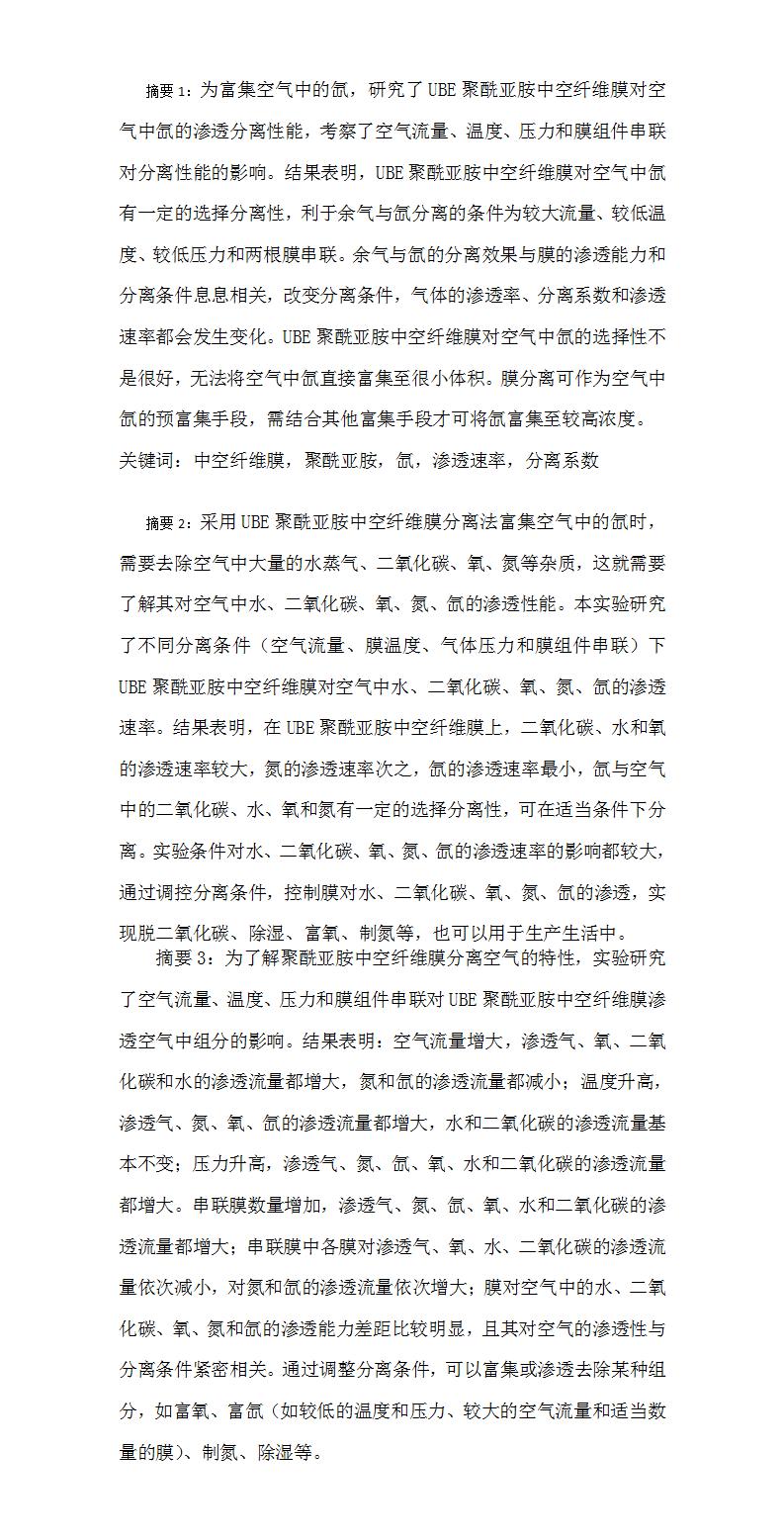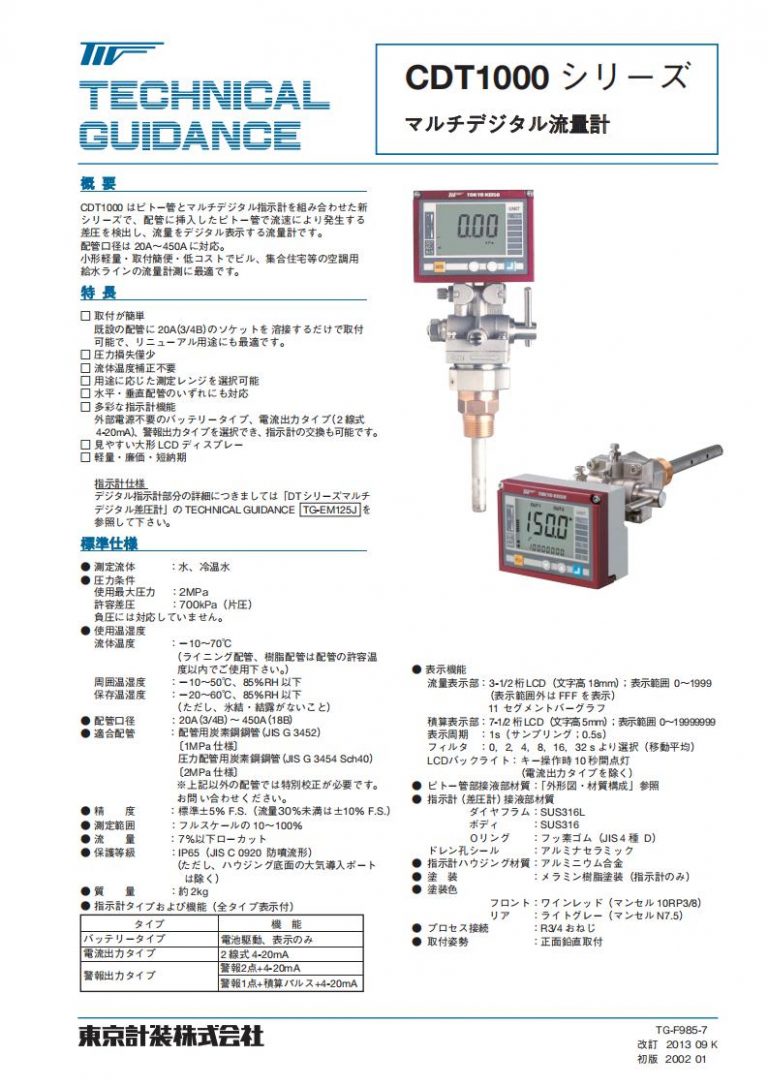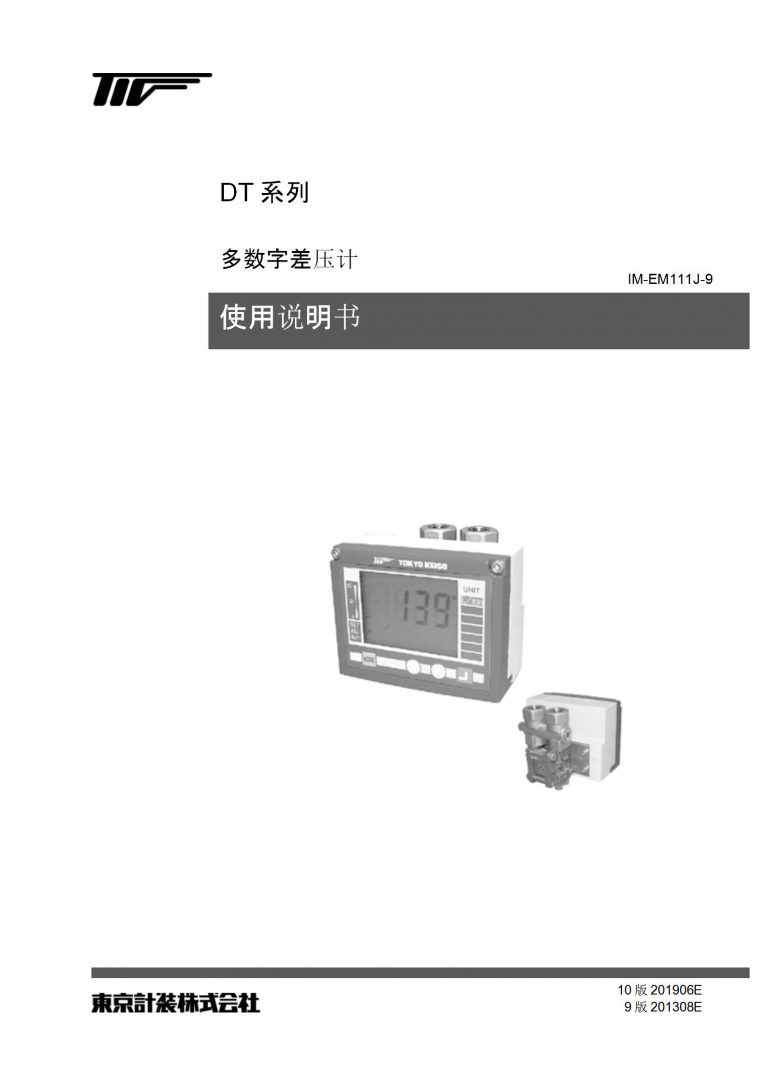

翻译原文对照
| 摘要1: |
| Abstract 1 |
| 为富集空气中的氙,研究了UBE聚酰亚胺中空纤维膜对空气中氙的渗透分离性能,考察了空气流量、温度、压力和膜组件串联对分离性能的影响。 |
| for enriching xenon in the air, the xenon separation performance of UBE Polyimide Hollow Fiber Membrane was studied. The effects of air flow rate, temperature, pressure and series connection of membrane modules on the separation performance were investigated. |
| 结果表明,UBE聚酰亚胺中空纤维膜对空气中氙有一定的选择分离性,利于余气与氙分离的条件为较大流量、较低温度、较低压力和两根膜串联。 |
| The result shows that UBE Polyimide Hollow Fiber Membrane has a certain selective separation characterisic for xenon in the air. Larger air flow rate, lower temperature, lower pressure and two connected membranes in series are in favor of xenon separating from air residual. |
| 余气与氙的分离效果与膜的渗透能力和分离条件息息相关,改变分离条件,气体的渗透率、分离系数和渗透速率都会发生变化。 |
| The separation effect of air residual and xenon is closely related to the permeability and separation conditions of the membrane. The permeability rate, separation coefficient and permeation velocity will be changed with the changing of separation conditions. |
| UBE聚酰亚胺中空纤维膜对空气中氙的选择性不是很好,无法将空气中氙直接富集至很小体积。 |
| The selectivity of UBE Polyimide Hollow Fiber Membrane for xenon in the air is not very good, and it can’t enrich xenon in the air to a very small volume directly. |
| 膜分离可作为空气中氙的预富集手段,需结合其他富集手段才可将氙富集至较高浓度。 |
| Membrane separation can be used as a preconcentration method for xenon in the air, which can be enriched to a higher concentration by combining with other enrichment methods. |
| 关键词: |
| Keywords: |
| 中空纤维膜,聚酰亚胺,氙,渗透速率,分离系数 |
| Hollow fiber membrane, polyimide, xenon, permeation velocity, separation coefficient |
| 摘要2: |
| Abstract 2 |
| 采用UBE聚酰亚胺中空纤维膜分离法富集空气中的氙时,需要去除空气中大量的水蒸气、二氧化碳、氧、氮等杂质,这就需要了解其对空气中水、二氧化碳、氧、氮、氙的渗透性能。 |
| When using UBE Polyimide Hollow Fiber Membrane separation method to enrich xenon in the air, it is necessary to remove most of air impurities such as water vapor, carbon dioxide, oxygen, nitrogen, which requires understanding the permeability for water, carbon dioxide, oxygen, nitrogen and xenon in the air. |
| 本实验研究了不同分离条件(空气流量、膜温度、气体压力和膜组件串联)下UBE聚酰亚胺中空纤维膜对空气中水、二氧化碳、氧、氮、氙的渗透速率。 |
| In this expriemnet we study the permeation velocity of Ube Polyimide Hollow fiber membrane to water, carbon dioxide, oxygen, nitrogen and xenon in the air under different separation conditions (air flow rate, membrane temperature, air pressure and connected membrane module in series ). |
| 结果表明,在UBE聚酰亚胺中空纤维膜上,二氧化碳、水和氧的渗透速率较大,氮的渗透速率次之,氙的渗透速率最小,氙与空气中的二氧化碳、水、氧和氮有一定的选择分离性,可在适当条件下分离。 |
| The results show that on the UBE polyimide hollow fiber membrane, the permeation velocity of carbon dioxide, water and oxygen is higher, then followed by nitrogen, and the permeation velocity of xenon is the smallest. Xenon has a certain of selective separation characteristic and can be separated from carbon dioxide, water, oxygen and nitrogen in the air under appropriate conditions. |
| 实验条件对水、二氧化碳、氧、氮、氙的渗透速率的影响都较大,通过调控分离条件,控制膜对水、二氧化碳、氧、氮、氙的渗透,实现脱二氧化碳、除湿、富氧、制氮等,也可以用于生产生活中。 |
| The experimental conditions have a great influence on the permeation velocity of water, carbon dioxide, oxygen, nitrogen and xenon. By adjusting the separation conditions, the permeation of water, carbon dioxide, oxygen, nitrogen and xenon can be controlled to achieve carbon dioxide removal, dehumidification, oxygen enrichment and nitrogen generation, which can also be used in production and our living. |
| 摘要3: |
| Abstract 3 |
| 为了解聚酰亚胺中空纤维膜分离空气的特性,实验研究了空气流量、温度、压力和膜组件串联对UBE聚酰亚胺中空纤维膜渗透空气中组分的影响。 |
| In order to understand the air separation characteristics of Polyimide Hollow fiber membrane. the influence of air component permeated from UBE Polyimide Hollow fiber membrane on air flow rate, temperature, pressure and membrane modules in series are studied. |
| 结果表明: |
| The results show that: |
| 空气流量增大,渗透气、氧、二氧化碳和水的渗透流量都增大,氮和氙的渗透流量都减小;温度升高,渗透气、氮、氧、氙的渗透流量都增大,水和二氧化碳的渗透流量基本不变;压力升高,渗透气、氮、氙、氧、水和二氧化碳的渗透流量都增大。 |
| As the air flow rate increases, the permeate flow rates of permeate gas, oxygen, carbon dioxide, and water all increase, but the permeate flow rates of nitrogen and xenon all decrease; when the temperature rises, the permeate flow rates of permeate gas, nitrogen, oxygen and xenon all increase, but the permeation flow of carbon dioxide and carbon dioxide is basically unchanged. as the pressure increases, the permeation flow of permeate gas, nitrogen, xenon, oxygen, water and carbon dioxide all increase. |
| 串联膜数量增加,渗透气、氮、氙、氧、水和二氧化碳的渗透流量都增大;串联膜中各膜对渗透气、氧、水、二氧化碳的渗透流量依次减小,对氮和氙的渗透流量依次增大;膜对空气中的水、二氧化碳、氧、氮和氙的渗透能力差距比较明显,且其对空气的渗透性与分离条件紧密相关。 |
| As the number of membranes in series increases, the permeate flow rates of permeate gas, nitrogen, xenon, oxygen, water and carbon dioxide all increase. The permeate flow rate of each membrane in the membrane series for permeate gas, oxygen, water, and carbon dioxide sequentially decreases, and the permeate flow rate of nitrogen and xenon sequentially increases. The permeability gap of the membrane for water, carbon dioxide, oxygen, nitrogen and xenon in the air is relatively obvious, and its permeability to air is closely related to the separation conditions. |
| 通过调整分离条件,可以富集或渗透去除某种组分,如富氧、富氙(如较低的温度和压力、较大的空气流量和适当数量的膜)、制氮、除湿等。 |
| By adjusting the separation conditions, certain components can be enriched or permeated to remove, such as oxygen enrichment, xenon enrichment (in the conditions of lower temperature and pressure, larger air flow and appropriate number of membranes), nitrogen generation, dehumidification and etc. |




